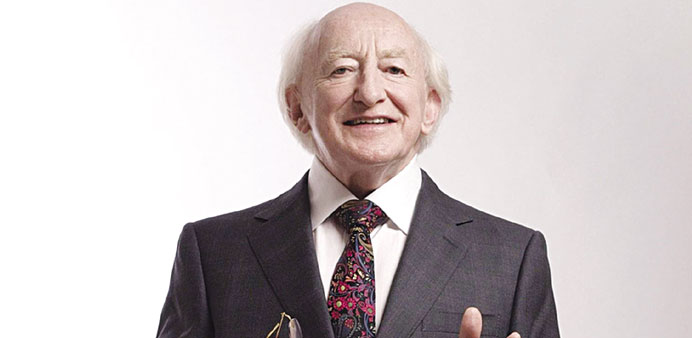AFP/London
President Michael D Higgins is to become the first Irish head of state to make a state visit to Britain, in another symbolic step forward for relations between the neighbouring countries.
The visit in April will come three years after Queen Elizabeth made a groundbreaking trip to the republic, which helped to heal deep-rooted unease and put Anglo-Irish relations on a new footing.
Higgins’s return visit will be seen as an official sign of further progress following the hard-won peace in Northern Ireland, which remains part of the United Kingdom.
Britain also voluntarily contributed billions of pounds towards an international bailout of the Irish economy in 2010.
The president’s Aras an Uachtarain official residence confirmed Higgins had accepted an invitation for a three-day state visit.
The 72-year-old poet is expected to stay at Windsor Castle, west of London, from April 8 to 10.
Irish Prime Minister Enda Kenny said in a statement: “I warmly welcome the official confirmation that President Higgins will pay an official visit to the United Kingdom. This is a further demonstration of the warm and positive relationship that now exists between Ireland and the United Kingdom.
“The state visit in April, following on the very successful visit to Ireland by Queen Elizabeth in 2011, will be a wonderful opportunity to deepen this even further.”
The sovereign’s highly-charged visit in May that year was the first by a British monarch since her grandfather king George V in 1911, before the republic won independence from Britain in 1922.
Despite the gradual warming of top-level ties, no Irish president has yet paid a state visit to the country across its only border.
Mary Robinson was the first Irish head of state to meet Queen Elizabeth, when she had tea with her in Buckingham Palace in 1996.
Higgins, a former arts minister, has met the 87-year-old monarch and her husband Prince Philip before, at Belfast’s Lyric Theatre in June 2012. And though he has visited mainland Britain several times since taking office in November 2011, they were not official state visits, where Britain summons up all its traditional pomp in a bid to strengthen cultural, diplomatic and economic ties.
State visits normally begin with a ceremonial welcome and a carriage procession. A lavish state banquet is thrown, at which both figureheads make speeches.
There is typically an exchange of personal gifts and a display of items relating to the visiting country drawn from the Royal Collection.
Visiting leaders usually meet the British prime minister, government ministers and the opposition leader. They normally attend a banquet hosted by the lord mayor of London, which is a chance to meet leaders of business and industry.
State visits traditionally see the visiting leader lay a wreath at the Tomb of the Unknown Warrior in London’s Westminster Abbey. During her state visit, Queen Elizabeth laid a wreath at Ireland’s Garden of Remembrance in honour of those who died fighting for Irish freedom from Britain. It was seen as a hugely symbolic moment.
Were Higgins to lay a wreath at the grave of the World War I combatant - symbolising all Britain’s war dead - it would be a similar landmark of reconciliation given the British military’s centuries of involvement in Ireland. Furthermore, Irishmen who fought in World War I were forgotten for decades due to deep unease over them serving in British uniform while Ireland’s independence struggle raged. They have only begun to be recognised in the Republic in recent years. Higgins attended Ireland’s main Remembrance Day service earlier this month.

